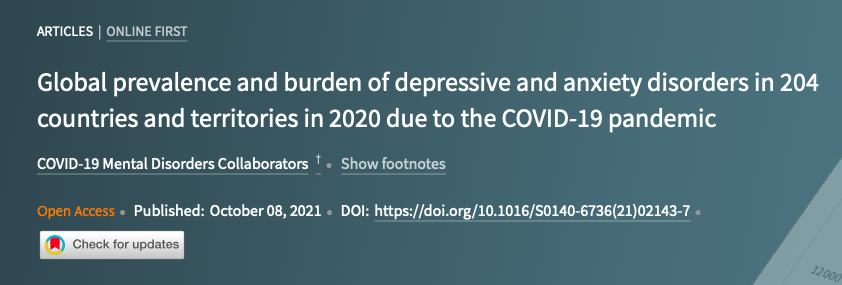The Psychological Impacts of Covid-19 Pandemic Measures: Lockdowns, Warnings, “Social Distancing”, “New Variants”. Drastic Increase in Depression and Anxiety
Do Not Remain Silent on the Results of the New "Lancet" Study! Death and despair worldwide set for years to come

All Global Research articles can be read in 51 languages by activating the “Translate Website” drop down menu on the top banner of our home page (Desktop version).
Visit and follow us on Instagram at @crg_globalresearch.
***
On 8 October, the renowned scientific journal “The Lancet” published a study on the frequency and burden of COVID19 pandemic measures worldwide in 2020.
According to the researchers and collaborators from the Australian University of Queensland and the University of Washington, the psychological interactions of lockdowns, warnings, “social distancing” and ever new “variants” led to a drastic increase in depression, anxiety disorders and permanent worry.
Women and younger people were most affected (1). According to UNESCO’s findings in this study, “COVID-19” also led to the “most serious disruption of global education in history” (2).
No one can or should remain silent about these research results – as well as about the deaths caused by the so-called COVID “vaccine”. If, as an educationalist and psychologist, one also takes into account that psychological and social injury inflicted in childhood can have an effect on future generations beyond adulthood, then the urgent question arises as to when we citizens of this world will finally break or end this vicious circle.
Supplement to the study in “The Lancet” by publication in “Save the Children”.
I would strongly recommend that every reader reads the entire Lancet study. It was originally published under the title: “Global prevalence and burden of depressive and anxiety disorder in 204 countries and territories in 2020 due to the COVID-19 pandemic” (3). “RT.DE” made the same point under the title “Study confirms: COVID measures led to massive increase in depression and anxiety disorders” on 10 October, drew attention to the study. The article is introduced with the following words:
“For the past year and a half, the Corona crisis has had people firmly in its grip. So far, little official attention has been paid to the psychological collateral damage. Now a study has appeared that took on this topic and provides explosive figures.” (3)
A qualified supplement to this study was published by “RT.DE” on 11 October with a reference to an article by the aid organisation “Save the Children”, which refers to data from the “Oxford Covid-19 Government Response Tracker”. Title: “Lockdown consequences: Number of mental illnesses in children rises sharply”. The lead of the RT.DE article states:
“According to one study, government-imposed restrictions in the Corona crisis have led to a significant increase in mental illness among children – particularly in cases of depression, anxiety, loneliness and also self-harm.” (4)
According to the charity, more than 83 percent of the children reported an increase in negative feelings. If this is not responded to, it is subsequently said, long-term damage can occur – even if the restrictions are lifted.
What conclusions do we want to draw from these study results?
According to the RT-DE article, the authors of the Lancet study called on governments and policymakers to “take urgent action to strengthen mental health systems around the world and meet the increased demand” (5). The charity Save the Children called on governments to “prioritise children’s mental health and regulated learning during and after the Covid crisis” (6).
But are these measures really enough? Wouldn’t it rather be about saving both the most affected women and all other people and especially the young generation on this globe from death and despair.
*
Note to readers: Please click the share buttons above or below. Follow us on Instagram, @crg_globalresearch. Forward this article to your email lists. Crosspost on your blog site, internet forums. etc.
Dr Rudolf Hänsel is an educationalist and a qualified psychologist. He is a frequent contributor to Global Research.
Notes
(1) https://dol.org/10.1018/50140-6736)21)021-43-7; https://de.rt.com/international/125511-erste-studie-ihrer-art-covid-massnahmen-depression/
(2) Op. cit.
(3) https://de.rt.com/international/125511-erste-studie-ihrer-art-covid-massnahmen-depression/
(4) https://de.rt.com/international/125460-lockdown-folgen-zahl-psychischen-erkrankungen/
(5) https://de.rt.com/international/125511-erste-studie-ihrer-art-covid-massnahmen-depression/
(6) https://de.rt.com/international/125460-lockdown-folgen-zahl-psychischen-erkrankungen/
Featured image is from Children’s Health Defense


